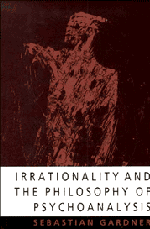Summary
THE PROBLEM
This book is concerned with the problems of self-understanding which are engendered by the experience of irrationality. The recognition that one's thoughts, behaviour and feelings run contrary to reason, and contradict one's identity as a rational being, naturally provokes self-interrogation, along the following lines: What causes irrationality? Is it the result of choice, or the effect of a mechanism? To what extent does irrationality involve self-awareness? Should it be said that the irrational mind is divided? What – if anything – is the purpose of irrationality? Where does responsibility for irrationality and its effects ultimately lie?
These questions are philosophical. The first assumption is that irrationality exists at the level of personal experience, where it is directly recognised; this is the enquiry's ‘existential’ point of departure. No metaphysical identification of one's Being with Reason, or commitment to a special theory of the nature of the mind, is therefore needed in order to set an investigation into irrationality in progress.
I will argue that psychoanalytic theory provides the most penetrating and satisfying explanation of irrationality. Given that irrationality is real, and requires explanation, this amounts to an argument for the truth of psychoanalytic theory.
THE SCOPE OF THE ENQUIRY
The topic of irrationality will be recognised by analytic philosophers as circumscribing a set of interconnected problems in the philosophy of mind, which can be defined in two ways, one narrow and one broad.
- Type
- Chapter
- Information
- Irrationality and the Philosophy of Psychoanalysis , pp. 1 - 12Publisher: Cambridge University PressPrint publication year: 1993
- 1
- Cited by



